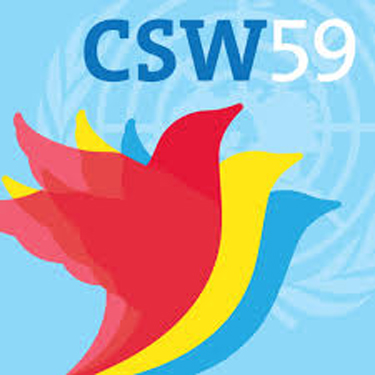The 59th Session of the Commission on the Status of Women convened during March 2015, Women’s Month, to review and appraise the 20th anniversary of the Beijing Platform for Action which was signed by 189 nations at the 4th World Conference on Women in Beijing in 1995. It also considered the outcome documents of the 23rd Special Session of the General Assembly which reviewed the implementation of the Beijing Platform for Action five years after its adoption.
The Platform for Action has12 critical areas of concern prefaced by the principle that women’s rights are human rights: Women and poverty, Education and training of women, Women and health, Violence against women, Women and armed conflict, Women and the economy, Women in power and decision making, Institutional mechanisms for the advancement of women, Human rights of women, Women and the media, Women and the environment, the Girl child.
The CSW is the principal intergovernmental body dedicated to the promotion of gender equality and the empowerment of women is comprised of 45 states elected for a period of four years by the Economic and Social Council of the United Nations.
A general discussion at the UN during the CSW includes statements by Member states, observers, and members of civil society. Aside from the official debates there are events outside of the Commission meetings organized by UN member states and by NGOs.
By the conclusion of the two week conference two outcomes occurred: a Political Declaration and Working Methods. Adopted by ministers and heads of state when they are present at the CSW, usually the first few days of the session, the declaration is not legally binding but operates more as a consensus statement. Expressing concern that progress has been slow and there are gaps in implementation of the Beijing Platform for Action, the Commission issued a political declaration to ensure that gender equality and women’s empowerment are incorporated in the Sustainable Development Goals. These are goals which the UN will work toward from 2015-2030 and will succeed the Millennium Development Goals. The final text of these goals, their targets and indicators will be adopted by the sixty-ninth session of the UN General Assembly in 2015. This political declaration also called for the ratification by all states of the Convention on the Elimination of All Forms of Discrimination against Women and its Optional Protocol.
The CSW also issued what is called Working Methods spelling out how it will proceed the following year.
Two criticisms were raised. NGOs focused on the lack of transparency, reflected in the fact that the political declaration was agreed upon at the beginning of the Commission meeting rather than at the conclusion, when more input from civil society would have occurred. Another criticism is that the declaration does not reflect fully the commitment to the 1995 Beijing Platform for Action. In an authoritative global review of 167 countries, their governments and civil society, Secretary General, Ban Ki-moon reported that progress in the last 20 years has been unacceptably slow with areas of stagnation and regression.
More information related to the CSW can be found at www.un.org

